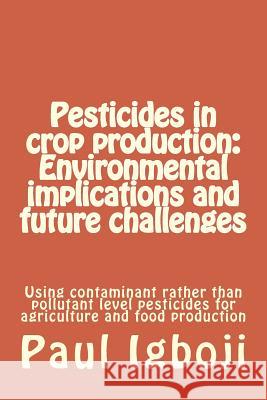Pesticides in crop production: Environmental implications and future challenges: Using contaminant rather than pollutant level pesticides for agricul » książka
Pesticides in crop production: Environmental implications and future challenges: Using contaminant rather than pollutant level pesticides for agricul
ISBN-13: 9781536806854 / Angielski / Miękka / 2016 / 34 str.
Pesticides in crop production: Environmental implications and future challenges: Using contaminant rather than pollutant level pesticides for agricul
ISBN-13: 9781536806854 / Angielski / Miękka / 2016 / 34 str.
(netto: 215,58 VAT: 5%)
Najniższa cena z 30 dni: 210,15 zł
ok. 13-18 dni roboczych.
Darmowa dostawa!
The use of pesticide in crop production is inevitable for a hungry world. The majority of world population are hungry, malnourished and hopeless, especially in sub-saharan africa, latin america and asia. For them anything can go for food when it comes to hunger and starvation. The soils in most of these places are impoverished and agricultural output is low. There are many incidences of tropical pests and diseases. All the farmers clamour for improved yield, no matter the means. For them government should not only provide fertilizers and pesticides but highly subsidize or make them free. If increased soil fertility and yield means pouring fertilizer and pesticides to agricultural fields without recourse to rates and soil test, they are ready and free to do so, as little or no regulations are enforced to regulate their use. Nevertheless, if wishes are horses, every developing world farmer will be king. Their wishes are not backed by financial and government power and wherewithal. You see three million farmers competing for 100 bags of fertilizers and 100 liters of pesticide per year with empty pockets. To them the grammar of pesticide in crop production: environmental implications and future challenges are capacity building workshop/seminar grammar where farmers come to wrestle with government and consultant facilitators on breakfast/dinner and envelope money. To them, that is their share of national or international donor cake, because after the workshop there will never be fertilizer or pesticides for their needs. Rather, the facilitators have fulfilled their legal and formal job of pocketing national or foreign donor money into their private bank accounts in the name of bribery and corruption, sometimes including nepotism and all the English in the world.Nevertheless, in developed world who are free from hunger and starvation, in addition to all the agricultural inputs and finance they need for maximum production; they know that all eyes are on them. What they do will make or mare their business. Since the farmers and investors do not want to loose their money as a result of product bycut or seizure and destroy; they operate under the ambient of the law. On the other hand no investor in developed world wants to be idle or engage in unprofitable business. Hence, all hands must be on deck to maintain maximum output and control price at national and international markets. No wonder Meermann et al (1997) lamented that even after 35 years of Rachel Carson publication of "silent spring" with devastating account of the effects of indiscriminate use of agrochemicals, the one sided push for increased output continues. Thus, nature is controlled to this end and reliance on pesticide has not diminished. According to the author, in northern countries, the environmental movement, followed hesitantly by government regulation, has had some impact on stabilizing and perhaps curbing agrochemicals; but in the south, the use of pesticides has increased and chemical companies aggressively expand their markets. However, the search for reliable alternative pest management methods will continue to face farmers, investors and scientists in this century even as pests develop resistance to some available pesticides in midst of transgenic crops. Till that feat food production at extra scale must go on using contaminant level pesticides and avoiding or banning pollutant level pesticides.











